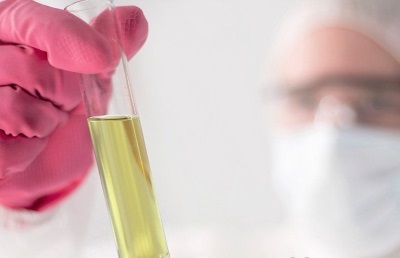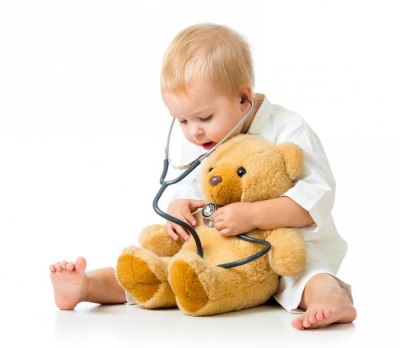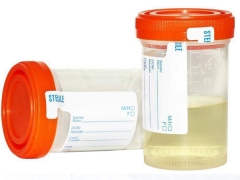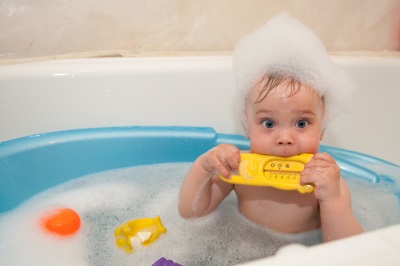The rate of leukocytes in the urine of a child and the causes of elevated values
The number of leukocytes may increase in various diseases of the child, therefore, white blood cells are always determined in blood and urine tests. What indicator is normal, why can white blood cells increase and what to do if there is a large number of white blood cells in the urine of a baby?
What show?
Normally, leukocytes enter baby urine in small amounts. Ideally, a white blood cell should not be in the field of view of a microscope at all, although a small number is allowed.
If a given urine test index is elevated, it suggests a doctor about possible inflammatory processes in the kidneys, bladder, or other parts of the excretory system. The more white blood cells are detected under the microscope, the more acute the disease progresses. Leukocyte elevation is called pyuria or leukocyturia.

Analysis Methods
The traditional and most common examination of the urine of a child, during which they also determine leukocytes, is general urine analysis. He is prescribed to all babies - both healthy and suspicious of diseases.
If this examination determined an increase in the number of leukocytes, the child may be assigned urine refining tests, during which blood cells are counted not in the field of view, but in a certain amount - in 1 milliliter of urine (Nechiporenko's test), in the amount allocated by the child per minute ( sample Amburzhe) or per day (sample Kakovskogo-Addis).
What is the norm?
Normal indicators of leukocytes in the urine of a child depend on the test being performed and the sex of the baby:
Study | Norm for boys | Norm for girls |
General urine analysis | Up to 5-7 in sight. | Up to 8-10 in sight. |
According to Nechyporenko | Less than 2000 per 1 ml of urine | |
According to Kakovsky Addis | Less than 2 million in daily volume | |
Across amburge | Less than 2000 per minute | |
What to do if the rate is increased?
First of all, assess whether the results can not be false. To do this, most often prescribed to retake a complete urinalysis. If the increase in the indicator is not very large (a few pieces in sight), then often do not need to do anything.
With a large excess of the norm, the baby is prescribed additional studies to confirm the presence of leukocyturia and find out its cause.
Could it be the cause of improper urine collection?
Indeed, leukocyturia may well be caused by violations of the urine collection of the child for analysis. For example, the baby’s genitals may be poorly washed or urine collected in a non-sterile container.
Why can send to repeat the analysis?
An increase in the leukocyte count in the urine is usually the reason for another test, since the result may be false if:
- A child has an acute respiratory viral infection or teething;
- On the eve of the baby had great physical activity;
- Urine was collected incorrectly.
Also, re-examination of urine is prescribed at the end of the course of treatment for infections of the urogenital system, in order to evaluate the effectiveness of therapy and make sure that the baby is already healthy.

Possible reasons
Leukocytes begin to penetrate into the urine of the baby in large quantities, when the walls of the blood vessels of the kidneys become more permeable. This happens when a child has:
- Urinary tract infection. This is the most common cause of white blood cells in children's urine.
- Congenital disease of the excretory system.
- Trauma to the ureters or kidneys.
- Pathologies of vessels that feed the kidneys and other departments of the excretory system.
- Infection of the external genital organs of the child with the involvement of the urethra.
- Diaper rash. They may appear due to the use of diapers, susceptibility of the baby to allergies and other factors.
- Amyloidosis or kidney tuberculosis.
- Urolithiasis disease.
- Reflux in the ureters.

What other symptoms indicate illnesses?
If leukocyturia is a symptom of the disease, then the child may still have the following signs of pathology:
- Difficult or too frequent urination;
- Crying before urinating (indicating pain in an infant);
- Complaints of painful urination (in older children);
- Pain in the abdomen or lumbar region;
- Color changes in urine;
- Turbidity of urine, sediment;
- Increased body temperature;
- Unpleasant smell of urine.
However, there are cases of asymptomatic bacterial infection in the urinary tract, when leukocytes in the urine are the only sign of a problem.
Additional examinations
After the detection of leukocyturia with the help of a clinical analysis of the urine of a child and the specification of the number of leukocytes by samples Nechiporenko or Kakovsky-Addis urine is sown on a nutrient medium to identify bacteria and determine their sensitivity to treatment. Also, the child must be prescribed clinical blood test.
In addition to laboratory tests, the child is sent for ultrasound of the kidneys and urinary tract. If such a study did not reveal anything, and the suspicion of the disease remains, the baby may be prescribed cystoscopy, x-rays or tomography.
Treatment
In the case when leukocytes in the urine become a sign of infection of the urinary system, the child is prescribed treatment. The main purpose is an antibiotic, which has a wide range of effects. This medicine should be prescribed only by a doctor. In no case should parents give antibiotics to children when an increased number of white blood cells is detected on their own initiative in the urine.
If taking antibiotics will be long, the child will also be prescribed drugs to keep the intestinal microflora in order. Depending on the clinical manifestations and diagnosis, the baby can also be given antiseptic preparations, antipyretics, antispasmodics, herbal preparations.
Prevention
To prevent infections of the urogenital system in children, a symptom of which is often pyuria, it is recommended:
- Do not neglect personal hygiene and do not forget to regularly change your baby’s underwear.
- Replenish the diet of the child with products that support immunity.
- Give the child enough to drink (best of all - clean water).
- Prevent constipation in your baby.
- Wash the baby in the direction of the buttocks.
Tips
- In order for leukocyte elevation not to be false, it is important to properly collect urine from a child. First of all, it concerns good washing and sterility of the container into which the urine sample is collected.
- Urine should be delivered to the laboratory immediately after collection within 1-2 hours. To make the results more accurate, collect the first urine that your child allocated in the morning.
You can learn more about leukocyturia by watching the video from the Union of Pediatricians of Russia.












